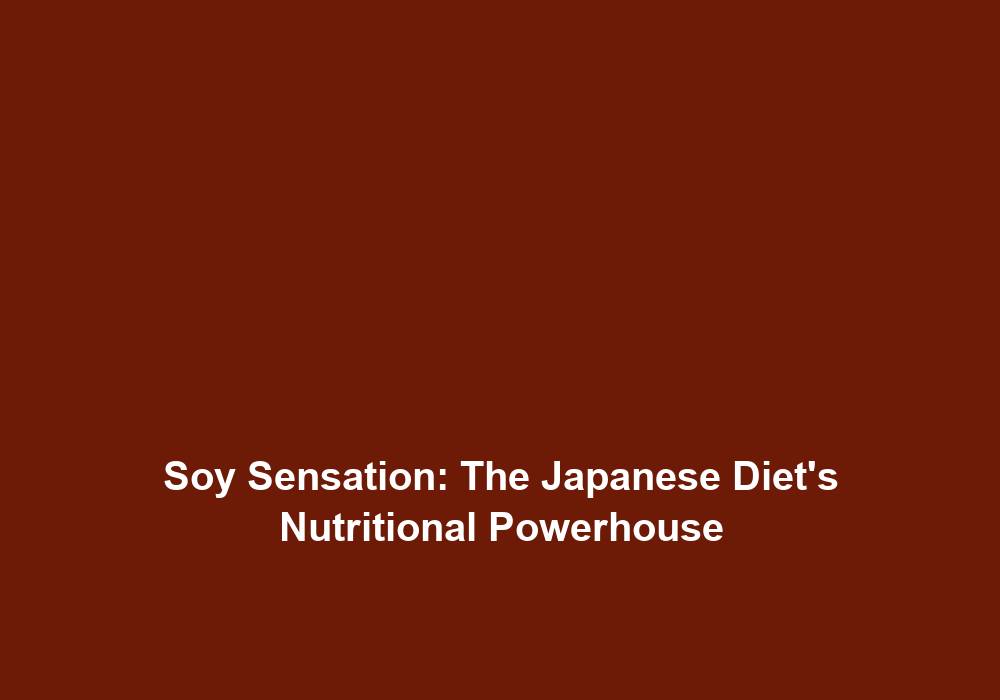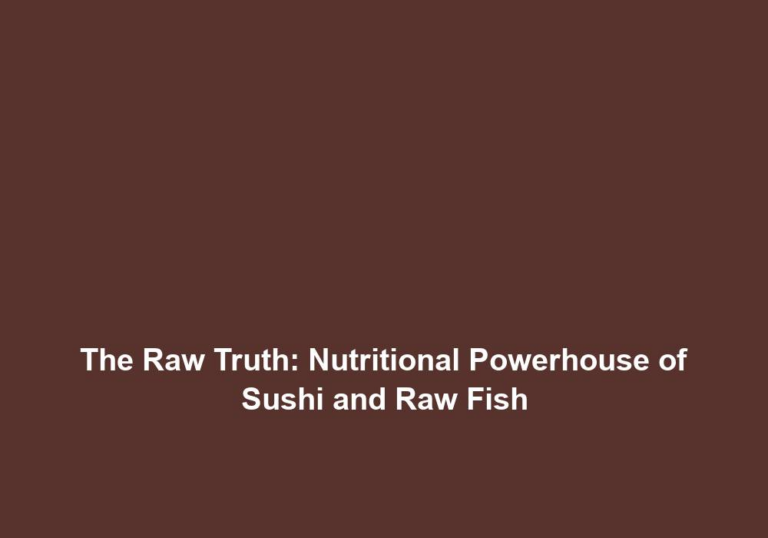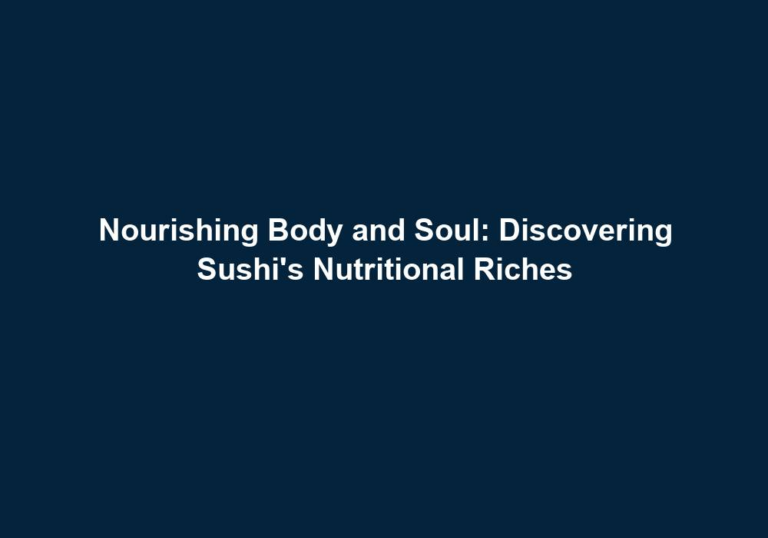Soy Sensation: The Japanese Diet’s Nutritional Powerhouse
The Japanese diet is renowned for its emphasis on fresh and nutritious ingredients, and one particular food item that has gained widespread recognition for its nutritional benefits is soy. As a staple in Japanese cuisine, soy has made its mark as a nutritional powerhouse, providing numerous health benefits and contributing to the overall well-being of individuals who incorporate it into their diet.
A Brief Introduction to Soy
Soy, or soybean, is a legume that has been cultivated for centuries in various parts of the world, especially in Asia. It is a versatile ingredient that can be consumed in various forms, including tofu, tempeh, miso, soy milk, and edamame. Soy products have not only become an integral part of traditional Japanese cuisine but have also gained popularity in many other parts of the world due to their nutritional value.
Soy is not only delicious but also highly nutritious. This humble legume is packed with essential nutrients that are vital for our overall health. Let’s explore the nutritional composition of soy in detail.
Nutritional Composition of Soy
Soy is an excellent source of essential nutrients and is considered a complete protein, meaning it contains all the essential amino acids required by the human body. This makes it an ideal choice for vegetarians and vegans looking to meet their protein needs. In addition to protein, soy is rich in other vital nutrients, including:
-
Fiber: Soy contains both soluble and insoluble fiber, which aids in digestion and promotes regular bowel movements. The soluble fiber in soy helps lower cholesterol levels, while the insoluble fiber adds bulk to the stool, preventing constipation.
-
Omega-3 Fatty Acids: These essential fatty acids are important for heart health and have anti-inflammatory properties. Regular consumption of soy can help reduce the risk of heart disease and improve overall cardiovascular health.
-
Vitamins and Minerals: Soy provides essential vitamins such as vitamin K, vitamin C, and several B vitamins, along with minerals like calcium, iron, magnesium, and potassium. These nutrients play a crucial role in various bodily functions, including bone health, immune function, and energy production.
Including soy in your diet can be a great way to ensure you’re getting a wide range of nutrients that are essential for your overall well-being.
Health Benefits of Soy
Incorporating soy into your diet can offer a range of health benefits, including but not limited to:
1. Heart Health
Soy products have been linked to a reduced risk of cardiovascular diseases. The presence of omega-3 fatty acids, fiber, and antioxidants in soy helps lower LDL cholesterol levels, maintain healthy blood pressure, and improve overall heart health. Consuming soy as part of a heart-healthy diet can significantly contribute to reducing the risk of heart disease.
2. Weight Management
Due to its high protein and fiber content, soy can aid in weight management. Protein helps increase feelings of fullness, reducing the likelihood of overeating, while fiber contributes to improved digestion and increased satiety. Including soy-based foods in your meals can help you feel satisfied for longer, preventing unnecessary snacking and promoting weight loss or maintenance.
3. Bone Health
Soy is a rich source of calcium, magnesium, and vitamin K, all of which are crucial for maintaining strong and healthy bones. Regular consumption of soy products can help prevent bone loss and reduce the risk of osteoporosis. Including soy in your diet, especially during adolescence and menopause, can have long-term benefits for your bone health.
4. Hormonal Balance
Soy contains compounds known as phytoestrogens, which have a similar structure to the hormone estrogen found in the human body. These phytoestrogens can help regulate hormonal imbalances in women, especially during menopause, and alleviate associated symptoms such as hot flashes and mood swings. Incorporating soy into your diet can provide natural support for hormonal balance.
5. Cancer Prevention
Studies have suggested that the consumption of soy products may contribute to a reduced risk of certain types of cancer, such as breast, prostate, and colon cancer. The presence of isoflavones, a type of phytochemical found in soy, has been linked to inhibiting the growth and spread of cancer cells. Including soy-based foods as part of a balanced diet may help in reducing the risk of developing certain types of cancer.
Incorporating Soy into Your Diet
Now that we understand the numerous health benefits of soy, let’s explore some simple ways to incorporate it into your daily diet:
1. Tofu Delights
Tofu is a versatile ingredient that can be used in various dishes, such as stir-fries, curries, and salads. Its mild flavor and sponge-like texture make it an excellent base for absorbing the flavors of the ingredients it is cooked with. Try marinating tofu in your favorite sauces or spices before cooking to enhance its taste.
2. Miso Magic
Miso, a traditional Japanese seasoning made from fermented soybeans, adds a unique umami flavor to soups, dressings, and marinades. It is also a rich source of probiotics, which promote a healthy gut microbiome. Use miso to enhance the taste of your dishes or as a base for flavorful broths.
3. Tempeh Temptation
Tempeh is a fermented soy product with a slightly nutty flavor and firm texture. It can be used as a meat substitute in burgers, sandwiches, or even crumbled as a topping for salads. Try marinating tempeh in your favorite sauces or spices before cooking to enhance its taste and texture.
4. Soy Milk Sensation
Swap out your regular cow’s milk with soy milk for a dairy-free alternative. Enjoy it in your morning coffee, cereal, or use it as a base for smoothies. Soy milk is a versatile and nutritious option for those who are lactose intolerant or following a plant-based diet.
5. Edamame Extravaganza
Edamame, young soybeans, can be enjoyed as a snack or added to salads, stir-fries, or sushi rolls for an extra dose of plant-based protein. Boil or steam edamame pods until tender and season them with a sprinkle of salt for a healthy and satisfying snack.
Conclusion
Soy has rightfully earned its place as a nutritional powerhouse in the Japanese diet. Its impressive nutritional profile, health benefits, and versatility in cooking make it a valuable addition to any balanced diet. By incorporating soy-based foods into your meals, you can enjoy the various health benefits it offers, such as improved heart health, weight management, bone health, hormonal balance, and potential cancer prevention. So, why not embrace the soy sensation and explore the world of delicious soy-based dishes to enhance your overall health and well-being?
Please note that the information provided in this article is for educational purposes only and should not replace professional medical advice.







